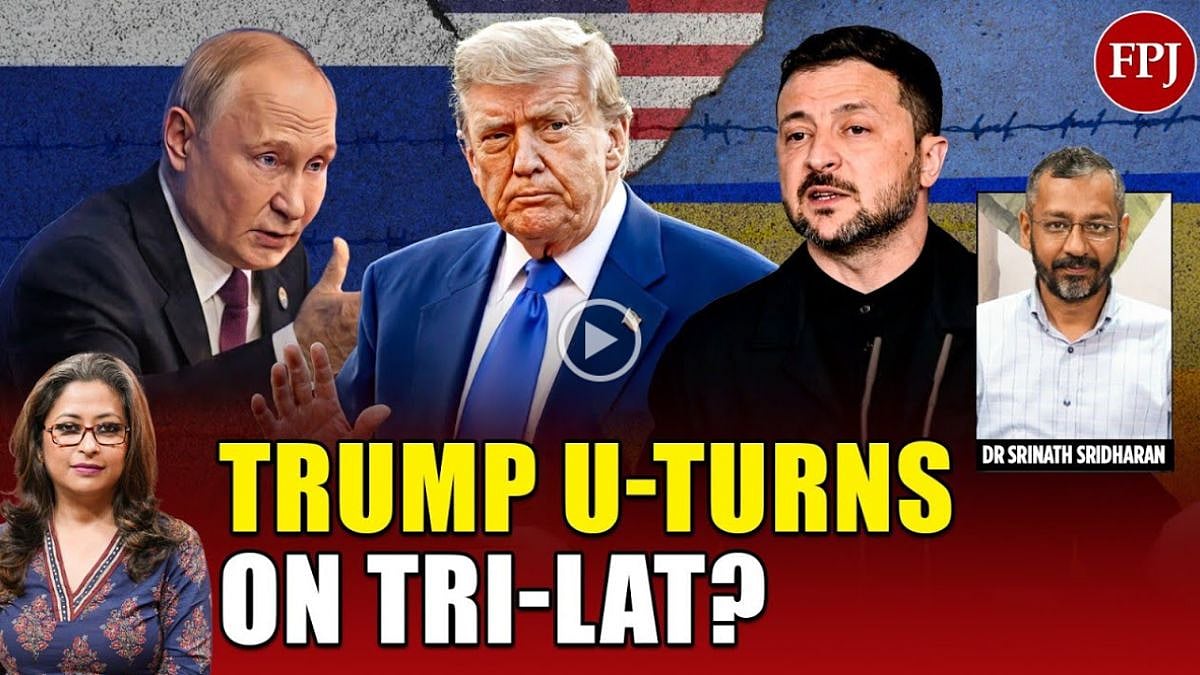FPJ Interview: US President Donald Trump's Changing Stance On Russia-Ukraine Mediation
Former U.S. President Donald Trump has once again shifted his stance on mediating peace talks between Russia and Ukraine. First, he hinted at a “trilat” involving himself, Vladimir Putin, and Volodymyr Zelensky. But soon after, he stepped back, insisting the two leaders should first meet bilaterally before he considers joining in.

FPJ Interview: US President Donald Trump's Changing Stance On Russia-Ukraine Mediation |
Intro: Former U.S. President Donald Trump has once again shifted his stance on mediating peace talks between Russia and Ukraine. First, he hinted at a “trilat” involving himself, Vladimir Putin, and Volodymyr Zelensky. But soon after, he stepped back, insisting the two leaders should first meet bilaterally before he considers joining in. To understand the deeper implications of this move, Afrida Rahman Ali, Executive Editor of Free Press Journal, spoke with Dr. Srinath Sridharan, Strategic Corporate Advisor and columnist.
Q&A Format
Q (Afrida Rahman Ali): Trump first pitched a trilateral meeting but now says it should only be bilateral. How do you see this shift?
A (Dr. Srinath Sridharan): The key is whether “lateral views” are allowed, or if it’s just Trump’s unilateral agenda. If Putin and Zelensky could solve it by themselves, they would have. The real issue is finding a “face-saver” for both. Trump is positioning himself as a peacemaker while keeping his options open.
Q: The White House even said India was sanctioned to push Russia to talks. What do you make of this approach?
A: It’s a poor diplomatic strategy. India has been unnecessarily dragged in. Despite sanctions, Russia’s economy hasn’t collapsed, and Europe still depends on Russian oil. India is being used as a pawn in this bigger game.
Q: You wrote that Putin flattered Trump during the Alaska summit. What was Putin’s strategy?
A: Putin played it calmly. He gave Trump just enough praise to let him feel like a global statesman without conceding anything. After two and a half hours, nothing concrete emerged. Putin left with the upper hand, Trump left with the illusion of peacemaking.
Q: What does this mean for Europe?
A: Europe is caught in between. It faces U.S. tariffs, still needs Russian oil, and fears that if Ukraine leaves NATO or loses territory, its own security is weakened. So, Europe is hedging its bets carefully.
Q: The U.S. Press Secretary said the shift from trilateral to bilateral was agreed with European leaders. Do you believe that?
A: Honestly, it looks like the White House adjusting itself to Trump’s social media posts. Policy stances keep changing daily. This feels less about diplomacy and more about Trump’s PR campaign—possibly for the Nobel Peace Prize.
Q: Are you suggesting Trump’s real motivation is winning the Nobel Peace Prize?
A: Absolutely. He’s wealthy, in his final presidential term, and chasing prestige. The Nobel would be a legacy marker. He’s already been nominated earlier. Much of his peacemaker projection—even in cases like the India–Pakistan ceasefire—is about branding himself as a global dealmaker.
Q: Finally, what’s at stake for India?
A: India has drawn its red lines—it won’t compromise on agriculture, dairy, or tech trade. But the bigger challenge is technological sovereignty. India still relies on Western big tech for digital infrastructure. Unless private investment in domestic industry grows, talk of sovereignty and trade resilience won’t materialize. The focus now must be building resilience and alternative export markets.
RECENT STORIES
-
-
-
-
-
